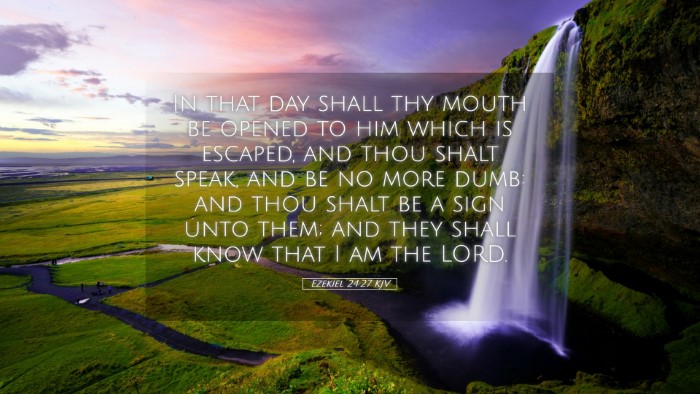Bible Commentary on Ezekiel 24:27
Ezekiel 24:27 states, “But when I speak unto thee, I will open thy mouth, and thou shalt say unto them, Thus saith the Lord God; He that heareth, let him hear; and he that forbeareth, let him forbear: for they are a rebellious house.” This verse serves as a pivotal point in Ezekiel’s prophetic ministry, highlighting themes of communication, divine authority, judgment, and the nature of the audience’s response.
Context and Significance
The context of Ezekiel 24 is significant, as it revolves around God’s judgment upon Jerusalem and its inhabitants. God instructs Ezekiel on how he will communicate His messages despite the stubbornness of the people. This idea of God opening Ezekiel’s mouth signifies divine initiation of prophetic speech, emphasizing that the message is not his own but rather comes from God Himself.
Prophetic Authority
In examining Ezekiel's role as a prophet, we see that he is a mouthpiece for divine revelation. Matthew Henry comments on the authority of God in communicating through Ezekiel, which underscores the seriousness of the message he delivers. God’s order to open Ezekiel’s mouth suggests the empowerment of the prophet, ensuring that his words carry divine weight.
The Rebellious House
The phrase “rebellious house” describes the people of Israel, particularly those in Jerusalem who have turned away from God. Albert Barnes notes that this rebellion is not merely a failure to obey, but a deep-seated defiance against God’s will. The characterization of the audience as “rebellious” serves to amplify the urgency of the message Ezekiel is about to deliver, as it speaks to their unwillingness to heed the warnings from God.
The Call to Hear
“He that heareth, let him hear; and he that forbeareth, let him forbear,” signifies the dual response expected of the audience—either to listen and act or to reject and avoid. Adam Clarke explains that this phrase encapsulates the broader theme of choice in scripture, wherein individuals must decide to respond to God’s word truthfully. The emphasis on hearing underscores the prophetic function of delivering a message that requires contemplation and action.
Theological Implications
This passage yields several theological insights that are critical for understanding God’s relationship with His people.
- Divine Sovereignty: The initiative taken by God to open a mouth for warning and revelation emphasizes His authority and governance over Israel. The passage reminds readers that God is actively involved in the redemption narrative.
- The Nature of Humanity: The description of Israel as “rebellious” represents the human tendency to resist divine guidance. This raises important implications regarding sinfulness and the need for divine intervention.
- Response to Divine Revelation: The call to hear indicates that salvation has a participatory element. Humanity is invited to respond to God’s revelations through faith and obedience.
The Role of Prophets
For pastors and theologians, the examination of the prophetic office is crucial. <>
Matthew Henry emphasizes the importance of perseverance in the prophetic role, pointing out that prophets often face rejection and hostility. This speaks to the current challenges in ministry where the voice of God can be misunderstood or ignored. The boldness required to continue speaking for God despite opposition is a vital lesson for modern-day preachers.
Encouragement for Modern Believers
Albert Barnes concludes with an encouragement to the contemporary church, reflecting on the need for believers to remain faithful in proclaiming the word of God amidst a culture of rebellion. Understanding the implications of our rebellion against God’s authority can lead to a more profound appreciation of grace and repentance.
Application for Pastoral Ministry
For pastors and church leaders, the message of Ezekiel 24:27 has practical implications:
- Importance of Communication: Pastors must seek to communicate God’s truths faithfully, understanding that their preaching can either be a means of grace or a vehicle of judgment.
- Understanding Rebellion: Recognizing the nature of rebellion in their congregations can inform strategies for counseling, teaching, and correction.
- Endurance in Ministry: Like Ezekiel, pastors are called to deliver messages persistently, warranting boldness in the face of adversity.
- Call to Action: Encourage congregations to actively listen and respond to God’s word, creating a culture of engagement and spiritual growth.
Conclusion
The examination of Ezekiel 24:27 reveals profound truths about divine communication, the role of rebellion, and the nature of prophetic authority. This chapter not only illustrates the challenges faced by Ezekiel but also mirrors the struggles modern believers encounter in ministry and personal faith. Understanding the dynamics expressed in this verse equips pastors, students, theologians, and scholars with a biblical framework to navigate their spiritual journeys and responsibilities in a contemporary context.


